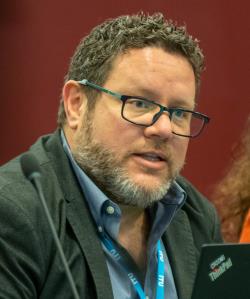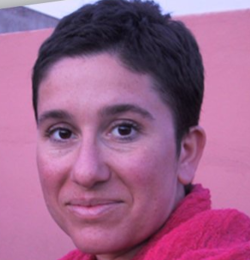Indigenous Digital Infrastructures and Emerging Technologies: Challenges, Capacities and Commons
Redes AC, Rhizomatica and APC
Session 240
In recent years, the rapid advancement of emerging technologies—such as artificial intelligence, sensors, and the Internet of Things (IoT)—has introduced new challenges and widened existing digital divides, especially for Indigenous Peoples and rural communities.
This session will focus on Indigenous digital infrastructures and digital commons as essential elements of inclusive, community-driven, and sustainable digital development. It will explore how Indigenous communities are designing, building, and governing their own digital infrastructures, asserting digital sovereignty while adapting to the opportunities and risks of new technologies.
The session will feature hands-on experiences from Indigenous practitioners and technologists who are incorporating emerging tools into their local contexts—for communication, connectivity, environmental monitoring, and cultural preservation. It will also reflect on capacity-building initiatives supported by the International Telecommunication Union (ITU) in Latin America and Africa, underscoring the role of training, community knowledge, and collective governance in shaping just and resilient digital futures.
Finally, the discussion will link these grassroots efforts to broader global policy frameworks, including the Global Digital Compact and the WSIS+20 vision.





-
 C1. The role of governments and all stakeholders in the promotion of ICTs for development
C1. The role of governments and all stakeholders in the promotion of ICTs for development
-
 C2. Information and communication infrastructure
C2. Information and communication infrastructure
-
 C3. Access to information and knowledge
C3. Access to information and knowledge
-
 C4. Capacity building
C4. Capacity building
-
 C6. Enabling environment
C6. Enabling environment
-
 C8. Cultural diversity and identity, linguistic diversity and local content
C8. Cultural diversity and identity, linguistic diversity and local content
-
 C11. International and regional cooperation
C11. International and regional cooperation
This session directly contributes to several WSIS Action Lines, particularly:
- C1. The role of governments and all stakeholders in the promotion of ICTs for development: By highlighting Indigenous-led digital infrastructure efforts and promoting inclusive governance models, the session demonstrates how community stakeholders are key actors in digital development.
- C2. Information and communication infrastructure: The session showcases how Indigenous communities are building and managing their own infrastructure, improving access in underserved areas.
- C3. Access to information and knowledge: Community networks and Indigenous digital commons expand access to locally relevant knowledge and tools, including in Indigenous languages.
- C4. Capacity building: Through case studies and ITU-supported training programs in Latin America and Africa, the session illustrates how locally grounded capacity-building enhances digital inclusion and resilience.
- C6. Enabling environment: It encourages supportive policy and funding environments for community-led connectivity, advocating for inclusive digital public infrastructure.
- C8. Cultural diversity and identity, linguistic diversity and local content: By focusing on cultural preservation and Indigenous digital sovereignty, the session aligns with the promotion of local content and the safeguarding of linguistic and cultural diversity.
- C11. International and regional cooperation: The session reflects strong interregional collaboration between civil society, technical actors, and international agencies, contributing to inclusive global governance.
-
 Goal 1: End poverty in all its forms everywhere
Goal 1: End poverty in all its forms everywhere
-
 Goal 4: Ensure inclusive and equitable quality education and promote lifelong learning opportunities for all
Goal 4: Ensure inclusive and equitable quality education and promote lifelong learning opportunities for all
-
 Goal 5: Achieve gender equality and empower all women and girls
Goal 5: Achieve gender equality and empower all women and girls
-
 Goal 9: Build resilient infrastructure, promote sustainable industrialization and foster innovation
Goal 9: Build resilient infrastructure, promote sustainable industrialization and foster innovation
-
 Goal 10: Reduce inequality within and among countries
Goal 10: Reduce inequality within and among countries
-
 Goal 11: Make cities inclusive, safe, resilient and sustainable
Goal 11: Make cities inclusive, safe, resilient and sustainable
-
 Goal 16: Promote just, peaceful and inclusive societies
Goal 16: Promote just, peaceful and inclusive societies
-
 Goal 17: Revitalize the global partnership for sustainable development
Goal 17: Revitalize the global partnership for sustainable development
This session contributes to several SDGs by promoting inclusive, community-led digital development:
- SDG 1 (No Poverty) – through improved access to communication and economic opportunities in marginalized areas
- SDG 4 (Quality Education) – by supporting local training and capacity building
- SDG 5 (Gender Equality) – by highlighting the role of women in Indigenous digital initiatives
- SDG 9 (Industry, Innovation and Infrastructure) – by fostering community-built infrastructure and innovation
- SDG 10 (Reduced Inequalities) – by addressing digital divides for Indigenous and rural communities
- SDG 11 (Sustainable Cities and Communities) – by strengthening local resilience and services
- SDG 16 (Peace, Justice and Strong Institutions) – by promoting participatory digital governance
- SDG 17 (Partnerships for the Goals) – through interregional collaboration and support from global partners
Relevant links and social media:
- REDES A.C.: https://redesac.org.mx
- CN Learning Platform: https://cnlearning.apc.org
- APC – Digital Inclusion: https://www.apc.org/en/our-work/themes/digital-inclusion
- Rhizomatica: https://www.rhizomatica.org
- ITU – Indigenous Peoples: https://www.itu.int/en/ITU-D/Digital-Inclusion/Indigenous-Peoples/
Social media:
- Twitter/X: @redes_ac | @apc_news | @rhizomatica
- Instagram: @redes_ac | @apc_network
- LinkedIn: Redes AC | APC